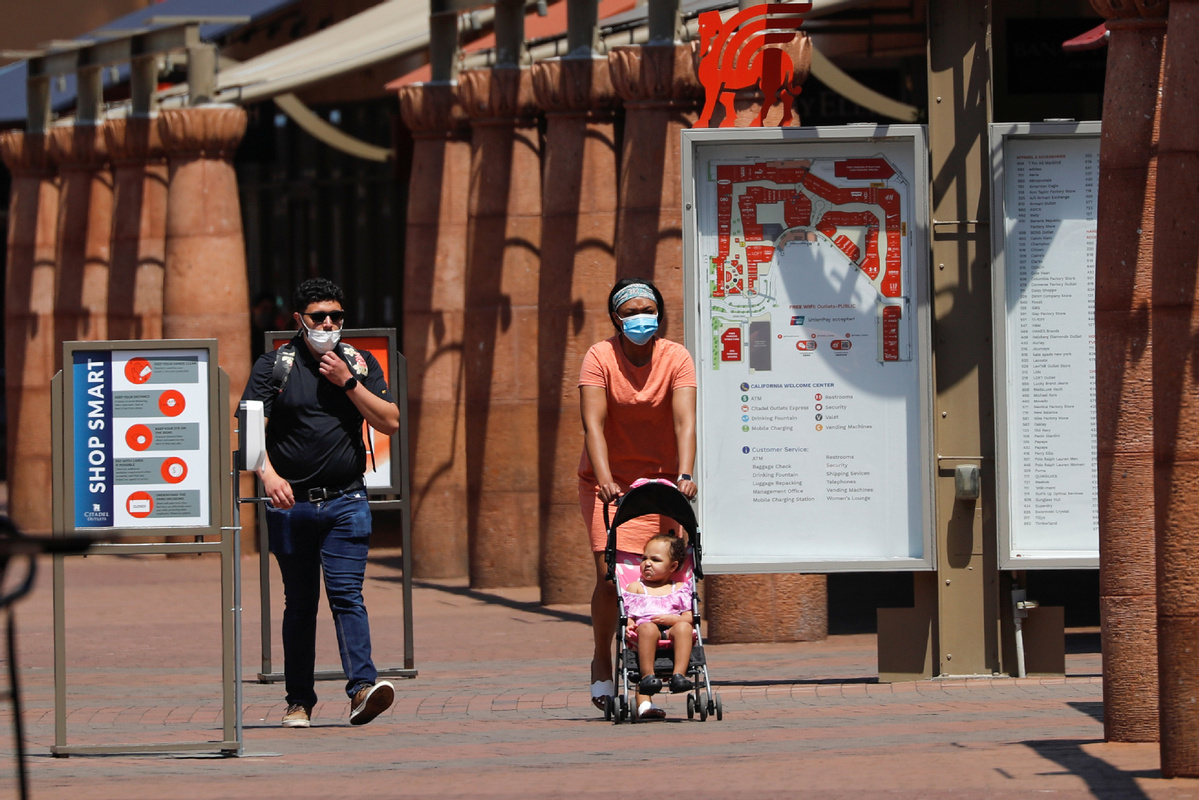Reeling US malls now must deal with pandemic's impact


The coronavirus pandemic has accelerated the evolution of the mall in the United States and underscored the basics of natural selection: adapt or die.
Green Street Advisors, a Newport Beach, California-based commercial real estate advisory firm, said as many as 50 percent of the 1,000 malls in the US are expected to close by the end of 2021.
Most of the survivors will be upscale and offer goods and services. Presence of an Apple or Gucci store is a sign of health.
"The current concept of the mall is dead – especially with the growth of e-commerce," Camilla Yanushevsky, an equity analyst at CFRA in Rockville, Maryland, told China Daily.
Movie theaters and restaurants long have been used to lure people to malls. They are now mostly closed to curb the spread of the coronavirus, and won't be enough to drive foot traffic in the future.
Next up: Make the mall a destination. This will involve creating an experience for shoppers by melding events with convenience and higher-priced goods while moving away from the volume sale of clothes.
"Enclosed shopping malls have a tremendous opportunity to reinvent themselves," Michael Brown, a partner in the consumer practice of global strategy and management consultant, Kearney and author of the report, "The Future of Shopping Centers", told China Daily.
"The path for long-term success means reducing dependency on pure retail and increasing emphasis on social gathering. COVID-19 is a temporary accelerator of the need for change in the sector. We will return to public dining, enjoying entertainment and socializing in public. Now is the time for malls to transform and be ready for the resurgence."
The risk is that the coronavirus forged a dramatic change in human behavior, and people will continue to nest at home after the pandemic abates.
But Brown noted that Netflix once was viewed as the end to movie theaters, and home food delivery was seen as the death knell of restaurants.
Both sectors avoided the apocalypse by offering an experience: Big screen, big sound and 3D movies at major theaters and ambience at fancy restaurants.
Brown said it's likely that as social beings, people will want to get out of the house and interact.
Anchor tenants, typically large department stores, once drew shoppers to malls. Now, it's up to mall owners to make the mall a destination for a range of new activities to draw potential customers.
A mall in East Rutherford, New Jersey, offers skiing on freshly made snow with a 160-foot vertical drop. Some mall owners are exploring the feasibility of concerts in the parking lot or large public areas.
Others offer simulated golf, driving ranges or putting greens, and some are working with community theater groups to stage live plays.
Malls in Denver, Dallas, Houston and Minneapolis are going back to the future with drive-in movies ranging from animated tales for children to horror flicks for teenagers. Watching a movie while sitting in a car makes social distancing easier.
Despite the need to move quickly, there likely will be no immediate turnarounds because many mall owners are strapped for cash, as some tenants, including the Gap, have missed rent payments.
About 60 percent of the malls are anchored by a department store, an idea introduced to the US by John Wanamaker in 1876 in Philadelphia. Current department stores are a variation on his 19th century theme and have been made obsolete by online shopping and changing consumer tastes.
In the near term, that means infirm department store chains are trying to save increasingly irrelevant shopping malls.
Major chains filing for Chapter 11 bankruptcy protection include JC Penney, Neiman Marcus, Brooks Brothers and J. Crew. Macy's said it will survive the pandemic, but with fewer stores and leaner operations.
Smaller mall tenants such as Victoria's Secret, a lingerie retailer, may use co-tenancy clauses to demand rent cuts or to break leases early if the anchor department store closes, analysts believe.
That could lead to more vacancies and begin a downward spiral for weaker shopping malls because there is little demand for new retail floor space. A large number of empty stores drives shoppers away — and creates more vacancies.
Meanwhile, mass-marketers Walmart, Target and Home Depot continue to thrive by generally locating away from malls.
Discount chains such as TJ Maxx and Marshalls have undercut big-name department stores on price. Nordstrom Rack, an off-price outlet store, is a bright spot in the otherwise dim outlook for parent Nordstrom, a luxury department store.
"Near term, we'll see promotions and sales to drive traffic," Nick Shields, senior analyst at Third Bridge, a New York investment research firm, told China Daily.
"The pitch will be: 'We're having a sale and you can take advantage of it only at the brick-and-mortar store'. That's the best bet at this point."
The sale of basics such as underwear and socks has migrated to discounters or online. Department stores and other mall retailers will all but abandon low-margin categories, analysts believe.
Department stores — and the immediate future of malls — therefore will depend on the sales of fewer items with higher profit margins. That is likely to mean a reduction of needed floor space, further pressuring mall owners' profits.
Shields of Third Bridge believes that department stores will attempt to attract customers to malls by offering services that aren't available at discounters or online.
"Virtual reality could allow a customer to quickly and easily try the look of several dresses or three-piece suits," he said.
"This is all new. A lot of department stores need to do whatever they can – and that includes throwing everything at the wall to see what sticks. The upfront costs are high, but for brick-and-mortar retailers there's no other choice."
Paradoxically, that may further undercut the future of malls. Unit costs are higher as volume drops – and volume almost certainly will drop as stores offer fewer items with higher profit margins.
"It's a shot in the dark," Shields said.































